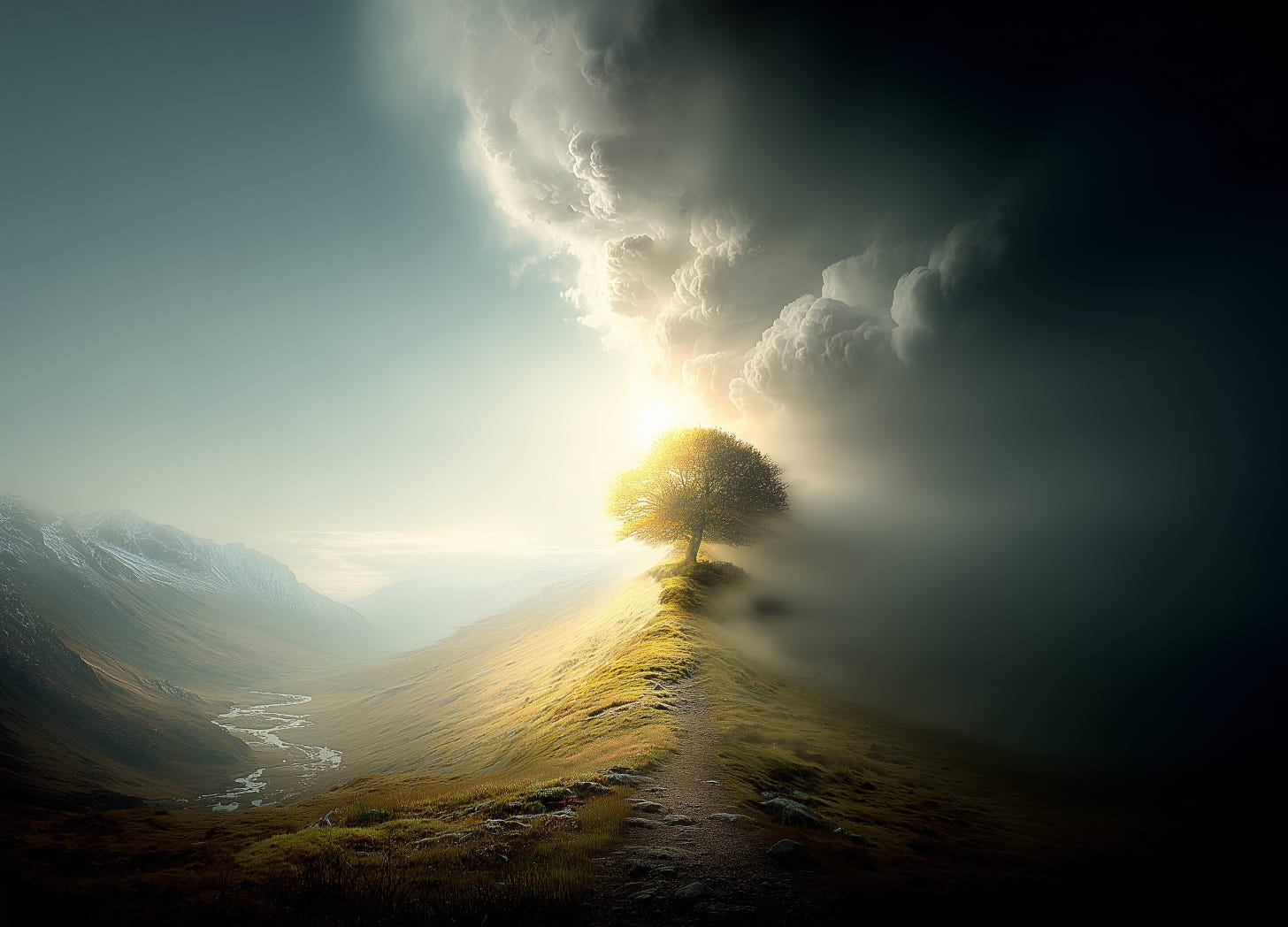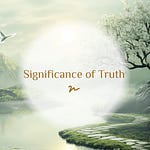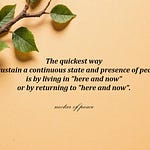🎧 Please listen to the audio using the player above.☝️
In the fifth episode of Nectar of Peace podcast, we will meet the extraordinary sage Osho for the first time, who presents the law of karma in a more psychological way - through the lens of our mental experience of the consequences of our actions. At the same time, Novo reveals to us the immense complexity of karma and why it is practically impossible to fully read it, let alone record it. There will also be practical advice on how to avoid accumulating negative karma.
What you’ll hear in this episode:
The law of karma, this time presented through the lens of our mind or psyche
Recording the consequences of our actions
Why karma cannot be fully described, recorded, or read
Practical examples of the influence and expansion of karma
Practical tips for protecting yourself from creating negative karma
My name is Mitja Žibert, and I’ll be your host on this podcast, which serves as an invitation to personal and spiritual growth.
Sources:
Novo: Lectures and Q&A archive
Osho: The Wisdom of the Sands, Vol 1 - Chapter #2
If this episode resonated with you, consider sharing it with friends or loved ones - you might just help someone on their path.
Episode transcription
Welcome to the fifth episode of the Nectar of Peace podcast, which is dedicated to sharing universal truths and wisdom taught by humanity’s greatest teachers and sages.
My name is Mitja Žibert, and I’ll be joining you in discovering these invaluable teachings that, if we choose to follow them, lead us to a life filled with the nectar of peace - which is what we all seek and need.
So, let’s see where we can discover and embrace it today.
In the previous, fourth episode, we, for the first time in this podcast, encountered the concept of karma. We learned that karma is a natural mechanism which, independently of us, ensures that every action is followed by an appropriate consequence. Of course, this is an overly simplified description of karma, yet it serves as a good basis for further understanding. At the same time, we learned that these very consequences largely determine who we are as individuals, how we experience things, what we are gifted with in life, and what we are deprived of.
So, karma plays an important role in the life of every individual, and therefore it is truly useful to at least be aware of it and its functioning—if not having a deeper understanding.
And to help us gain a better awareness of karma and its functioning, today we will be helped by the remarkable modern-day sage Osho and the teacher Novo, whom, of course, I personally cannot leave out.
So, it’s best to release all mental blockages and allow me to guide you through the second part of our exploration of that which accompanies us through life, both in the good and in the bad.
Teachings
When, on the path of discovering the truths about life, we encounter various teachers, we can quickly notice that—at least on the surface—there may be significant differences between them. This can often be seen most clearly in the way they present these truths and teachings.
Some lay them out for us in a more abstract manner, speaking of God, love, or final liberation, while others choose a more rational approach, focusing instead on human psychology and our concrete, everyday challenges. And then, there are also those who present these truths in both ways at the same time… good examples of such teachers being Osho and Novo.
So, with that in mind, let’s see how Osho, in a very rational way, presents karma through the lens of our mind and psyche. It is his answer to a question from one of his visitors, who asked him: “What is the law of karma?”
Osho replied to him like this:
»It is not in fact a law, because there is nobody behind it as a lawgiver. On the contrary, it is intrinsic to existence itself. It is the very nature of life: whatsoever you sow, you reap.
But it is complex, it is not so simple, it is not so obvious.
To make it more clear, try to understand it in a psychological way, because the modern mind can understand only if something is explained in a psychological way. In the past, when the law of karma was talked about -- when Buddha talked about it and Mahavira talked about it -- they had used physiological, physical analogies. Man has gone far away from that; man has moved far away from that. Now man lives more in the psychological, so this will be helpful.
Every crime against one's own nature, every one, without exception, records itself in our unconscious - EACH crime.
And what is a crime? It is not because the court of Manu says it is a crime, because that court is no more relevant; not because the Ten Commandments say it is a crime, that too is no more relevant; not because a certain government says it is a crime, because that goes on changing. Something is a crime in Russia and the same thing is not a crime in America. Something is a crime according to the Hindu tradition and the same thing is not a crime according to the Mohammedan tradition.
Then what is crime? There has to be a universal definition for it.
My definition is: that which goes against your nature, that which goes against yourself, your being, is a crime.
And how to know that crime? Whenever you commit that crime it records in your unconsciousness. It records in a certain way: it records and starts giving you a feeling of guilt. You start feeling yourself despised by yourself, you start feeling yourself unworthy, you start feeling yourself not as you should be. Something inside you becomes hard, something closes inside you. You are no more as flowing as you have been before. Something has become solid, frozen; that hurts, brings pain, and brings a feeling of unworthiness.
Karen Horney has a good word to describe this unconscious perceiving and remembering. She says "It registers". I liked it... it registers. Everything that you do registers itself automatically. If you have been loving it registers that you are loving; it gives you a feeling of worth. If you have been hateful, angry, destructive, dishonest, it registers and gives you a feeling of unworthiness, a feeling of being something below human, a feeling of inferiority. And whenever you feel unworthy you feel cut off from the flow of life. How can you flow with people when you are hiding something? Flow is possible only when you expose yourself, when you are available, TOTALLY available.
If you have been cheating your woman and seeing another woman, you cannot be with your woman totally. It is impossible, because it registers: deep in your unconscious you know that you have been dishonest, deep in your unconscious you know that you have betrayed, deep in your unconscious you know that you have to hide it, that you are not to reveal it. If you have something to hide, if you have something to keep secret from your beloved, there will be distance -- the bigger the secret, the bigger the distance will be. If there are too many secrets then you are completely closed. You cannot relax with this woman, and you cannot allow this woman to relax with you because your tenseness creates tenseness in her, her tenseness makes you even more tense, and it goes on, creating a vicious circle.
Yes, it registers in our books, in our beings. Remember, there are no books which God is keeping: that was an old way of saying the same thing. Your being is the book! Whatsoever you are and whatsoever you do is constantly being registered. Not that there is somebody writing it; it is a natural phenomenon. If you have been lying it is registered that you are lying, and now you have to protect those lies, and to protect one lie you will have to tell one thousand lies, and again to protect those one thousand lies you will have to go on and on and on. You become, by and by, a chronic liar. Truth becomes impossible for you, because to tell one truth will be dangerous now. See how things go together: if you tell one lie then many lies are invited -- the same attracts the same -- and now truth is unwelcome, because the darkness of the lies will not like the light of truth. So even when your lies are not in any danger of being exposed you will not be able to speak truth. If you speak one truth, many other truths are invited -- the like attracts the like.
If you are naturally truthful it is very difficult to lie, even once, because all that truth protects you. And this is a natural phenomenon. There is no God keeping a book. You are the book. You are the God; your being is the book. Abraham Maslow says, "If we do something we are ashamed of, it registers to our discredit. And if we do something good, it registers to our credit." You can watch it; you can observe it. The law of karma is not some philosophy, some abstraction. It is simply a theory which explains something true inside your being.
The net result: either we respect ourselves, or we despise and feel contemptible, worthless and unlovable.
Every moment, you are creating yourself; either a grace will arise in your being or a disgrace: this is the law of karma. Nobody can avoid it. Nobody should try to cheat on karma, because that is not possible.
Watch... and once you understand it things start changing. Once you know the inevitability of it you will be a totally different person. «
In the way Osho presented this teaching, you may have noticed that he referred to what is given, for example, in the Ten Commandments as irrelevant. But this by no means means that Osho denied the value and importance of these commandments. He was simply aware that people have drifted so far from their own moral compass that they no longer recognize what lying, stealing, violence, and the like really are. That’s why he wanted to present karma from the perspective of our inner, psychological experience of the consequences of past actions. And this is something we all feel, even though we hardly admit ourselves to be their source.
At the same time, he led us to another important key for a better understanding of how karma works. Namely, the vicious cycle that Osho pointed out shows that the karmic system does not only include the direct consequences of our actions, but also the consequences of those consequences, and so on. Karma is, in fact, a living process that is constantly changing and responding.
And precisely because of this, once we are caught in this cycle, it is extremely difficult to break free, since the consequences of our actions—beyond our awareness or control—can spread very far. This very aspect of karmic functioning is explained by Novo, who in the process also points to the remarkable complexity of the karmic system itself. He says the following:
“Karma is a unique phenomenon in life that cannot be explained, one about which no books can be written, because no one can explain it based on life. This is because karma has an incredibly huge way of expansion, for which there is no way to explain it through books or words—not even in ten years, twenty years… in fact, not even over the course of several lifetimes.
Let me explain why this is so.
For example, let’s say we do something evil to another person. If, as a result of this evil deed, only that person suffers, then at that moment it can be seen that we have created karma only toward that person. That much is visible, and someone who is a karmic theorist or researcher would conclude that you have karma only towards that person.
However, if this person to whom we have done karma has, for example, a family, then the moment the family learns that an evil deed has been done to this person—that they have been in some way wronged or injured—this information will also affect them; it will change them.
So, if before the family knew about it, someone who knows how to read karma told you that you had created karma only toward that one person, then now, if they truly know how to read karma, they would see that this karma is no longer the same—it has now spread to the family. Now the wife, children, and others are also suffering because of it.
And if we continue along this line… for example, if because of this karma the person is no longer the same and is now unable to help their children—say, they cannot provide them with schoolbooks—then the children will start complaining that they have no books because their father has no money. In this way, the karma spreads to the children. And they, in turn, will now create karma toward others. Namely, because the children in this case don’t have the awareness of who is truly to blame, they will blame their father, saying, “Because of him I don’t have books,” and out of their own distress, they will affect other children.
That is why I want to convey that karma is a unique phenomenon that cannot be controlled in life.
What a human must understand is that whether their action will be good or bad is not dependent on them. So, what then is dependent on a human? What is within a human’s control is the awareness that there is no need to initiate an action (but for this, a certain level of consciousness must be reached), or, if they do choose to act, they must understand that they must become the victim of various consequences. They must be aware of this.
No matter how good one is—they may be a guru, a saint, or whatever—if they initiate an action, it can cause various kinds of harm to themselves or to others. There is no guarantee.
Therefore, a human must learn that they can only have control over themselves. They cannot control others. And they can never guarantee in any way that they will be able to make others either happy or unhappy, because everyone reacts to an action based on their own free will.
Let me emphasize again that karma is fundamentally a living process that can expand or change in any situation, and that the initial action alone is not enough to conclude that it has produced a specific amount of karma.”
In connection with this teaching from Novo, I would like to specifically point out one immensely important aspect of karma—namely, that although we choose our own actions, the consequences remain beyond our control.
For example, if we put someone in a bad mood, we have created negative karma toward that person. And if that person, because of their bad mood, then harms someone else, that harm also goes onto our negative karmic account. And then, those who were indirectly harmed may continue this negativity… and all of that, too, is added to our karmic account.
So, potentially, even from an apparently harmless action, through consequences that are outside our control, we can accumulate a significant negative karmic debt. This, of course, applies when the consequences are negative. If the consequences are positive, then we likewise add to our karmic account—but in that case, the positive karma. Or, as mentioned in the previous episode, we thus reduce the negative part of our karma.
And precisely because we have no control over the consequences of our actions, it also follows that there is no guarantee in life that a single action—no matter how good—will bring only good consequences, since this also depends on the other person’s karma.
Novo laid out this crucial part of understanding the functioning of the karmic system like this:
»If you create good karma, this will trigger good karma in those who desire goodness. However, there are people who, even if you create good karma, do not wish for good karma because they are inclined toward bad karma. In such cases, they will begin to act against good karma with bad karma.
For example, someone might do a good deed, but another person may not like it, and because of this, they become angry and, from that good deed, will now cause negative consequences. On the other hand, if this good deed suits someone, they will trigger a positive consequence.
Take, for instance, a criminal and an honest person. If the criminal wishes to engage in dishonest activities, while the honest person wishes to act honestly, then when someone does something good, it will be acceptable to the honest person but not to the criminal. And because this good is not in the criminal’s interest, the criminal will now start actions which are even more noticeably negative, possibly even killing—just to protect his criminal intentions.
Or, put another way: a good person seeks the company of other good people, while a bad person or a criminal does not seek the company of good people. They prefer their own criminal company because they are not satisfied with the company of good people. They know that a good person will not allow them to continue as a criminal. They would rather destroy the good person simply so they can continue with their dishonest life.«
By explaining that another person’s reaction to our action depends on their karma, Novo also indirectly invited us to be extremely mindful of what kind of company we choose in life… since this too has a significant influence on the shaping of our own karma. Or, as Osho put it: the like attracts the like.
And once we truly internalize today’s teaching, we will begin to notice that—unless we know another person really well, and even then there is no guarantee—we truly have no control over how that person will respond to our action. And so, we can never know in advance what chain of consequences our action will trigger.
With this aspect of karma in mind, I invite you to revisit the first episode, where Novo lays out three key steps for living. Without this understanding of karma, these steps might sound rather meaningless or even heartless. But with this knowledge, the reason why Novo presented these three steps becomes clear, as well as how, if we follow them, they constantly protect us from the risk of creating negative karma.
For additional protection against creating negative karma, Novo offered one more practical approach. He suggested that we make the effort to always leave the person we are in contact with in a better state than they were before.
Conclusion
And so, we have reached the end of the second part about karma. Here, I must add that sometimes people lament to me that all of this is too complicated and that they cannot spend so much time dealing with it or thinking about it.
My answer to that is: as long as we strive to live righteously and morally, and every day try to notice in ourselves where we still do wrong — and then gradually let go of these habits or reactions — we don’t really need to concern ourselves with a deeper understanding of karma… for karma works independently of us and our understanding of it. It is a completely natural and practical mechanism that continuously works towards balance throughout all of creation.
And through this, it sooner or later brings anyone who causes imbalance in any way or with anyone to bring that imbalance back into balance themselves—whether through good or through pain.
And, so that we can increasingly experience this return to balance as something pleasant rather than painful, instead of living through Karma, we are each day given the opportunity and the ability to choose instead to live according to Dharma.
That is step by step, realization by realization … until, at last, we can truly taste the real sweetness of the nectar of peace.
If you found the episode interesting and useful, I invite you to leave a like or comment, or even better, share the episode with others - possibly helping them choose a better way of living. For notifications about new episode releases, you are welcome to sign up for free at www.nectarofpeace.com.
If you have any questions about the topics covered in this podcast, or if you'd like to have a more personal conversation with me about how to better internalize and apply them in your life, or if you just need some support, feel free to email me at mitja@nectarofpeace.com.
And once again, in the spirit of the Nectar of Peace, I send you greetings with the wish for peace.













